Search Atlas
Visualizing Divergent Search Results Across Geopolitical Borders
by Rodrigo Ochigame1 and Katherine Ye2
1Massachusetts Institute of Technology, 2Carnegie Mellon University
(equal contribution)
with design by micah epstein
appearing in ACM Designing Interactive Systems (DIS 2021)
Contact: team@searchatlas.org
Talk
Teaser video
Abstract
The internet is full of invisible borders—geographic, linguistic, cultural, political—that circumscribe the information each user sees. Search engines shape such “information borders” by tailoring results according to geolocation, language, and other user profiling. We present Search Atlas, a tool paired with visualizations that enable users to see and cross these borders. For instance, how do search results for the same query differ for Brazilian, Turkish, and Indian users? Given a query, the tool displays multiple lists of Google search results, highlighting distinctive words for each set of parameters. Then, we provide visualizations that juxtapose and cluster Google results across countries, revealing new information borders and regions that can vary widely depending on the query. By exposing the partial perspective of a search engine, Search Atlas invites users to experience the internet from divergent positions and to reflect on how their online lives are conditioned by technological infrastructures and geopolitical regimes.
Twitter thread
Excited to announce Search Atlas, a new project (w/ Rodrigo Ochigame) in DIS '21!
— Katherine Ye (@hypotext) July 2, 2021
We built a search engine that lets you search across languages & locations.
Making searches worldwide, we discovered surprising "borders" & "regions" in Google’s results.https://t.co/7oPpm8pW42 pic.twitter.com/2wqed8HnUN
Find it here.
Selected figures
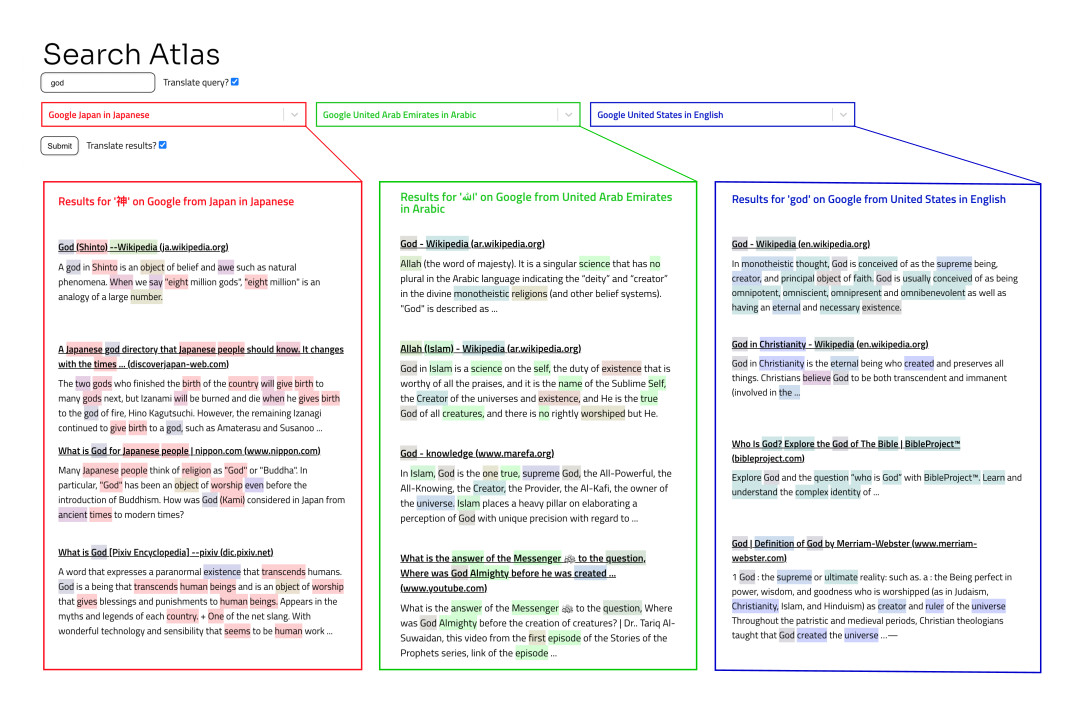
Fig. 3. Results for a search for “god.” In Japan, the results emphasize Shinto spirits (kami). In the United Arab Emirates, they point exclusively to Islamic sources. In the United States, they refer exclusively to a monotheistic Christian god.
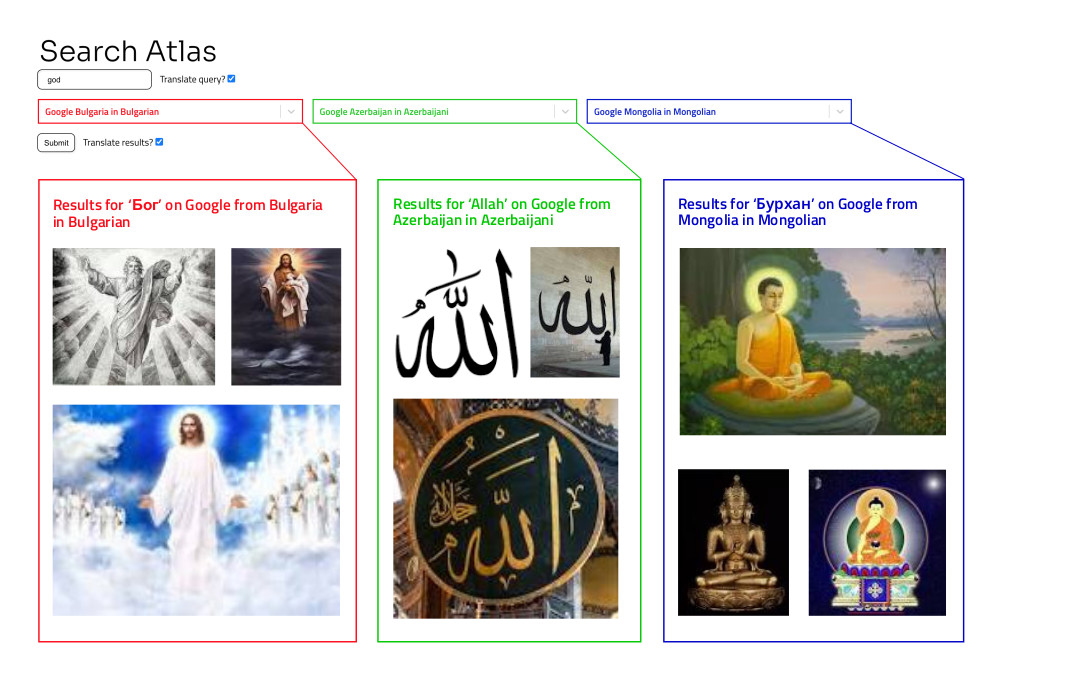
Fig. 5. Image results for a search for “god.” In Bulgaria, the results depict a traditional Christian god. In Azerbaijan, they are calligraphic images of the word “Allah” in Arabic. In Mongolia, they are Buddhist paintings.
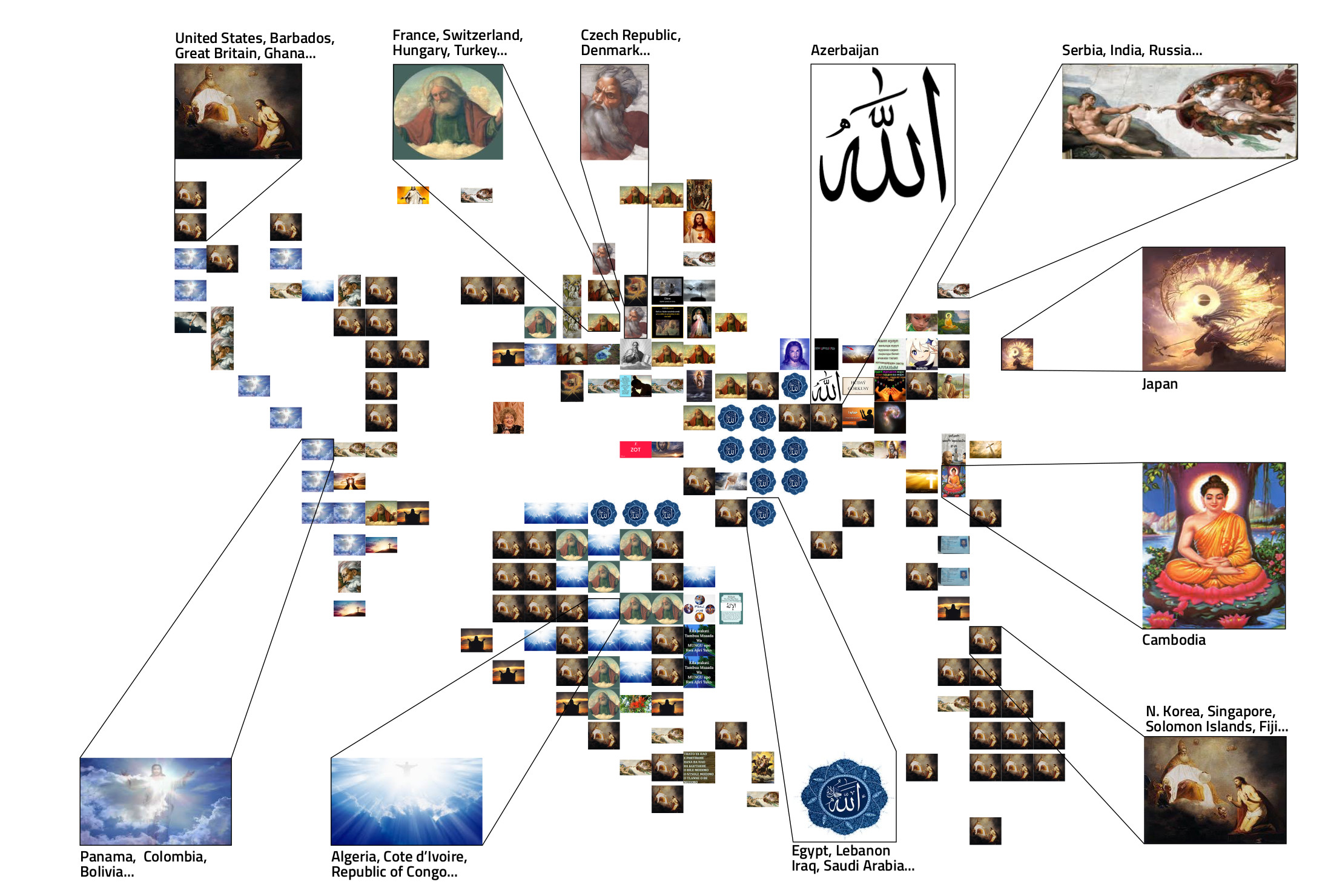
Fig. 1. A world map of “god” according to Google. This map shows top image results for translations of “god” in the default languages of most Google-supported countries, overlaid on the approximate geographic location of each country. Christian-majority countries tend to show images of a Christian god, Muslim-majority countries tend to show images of Allah (in written Arabic), and Buddhist-majority countries tend to show images of Buddha.
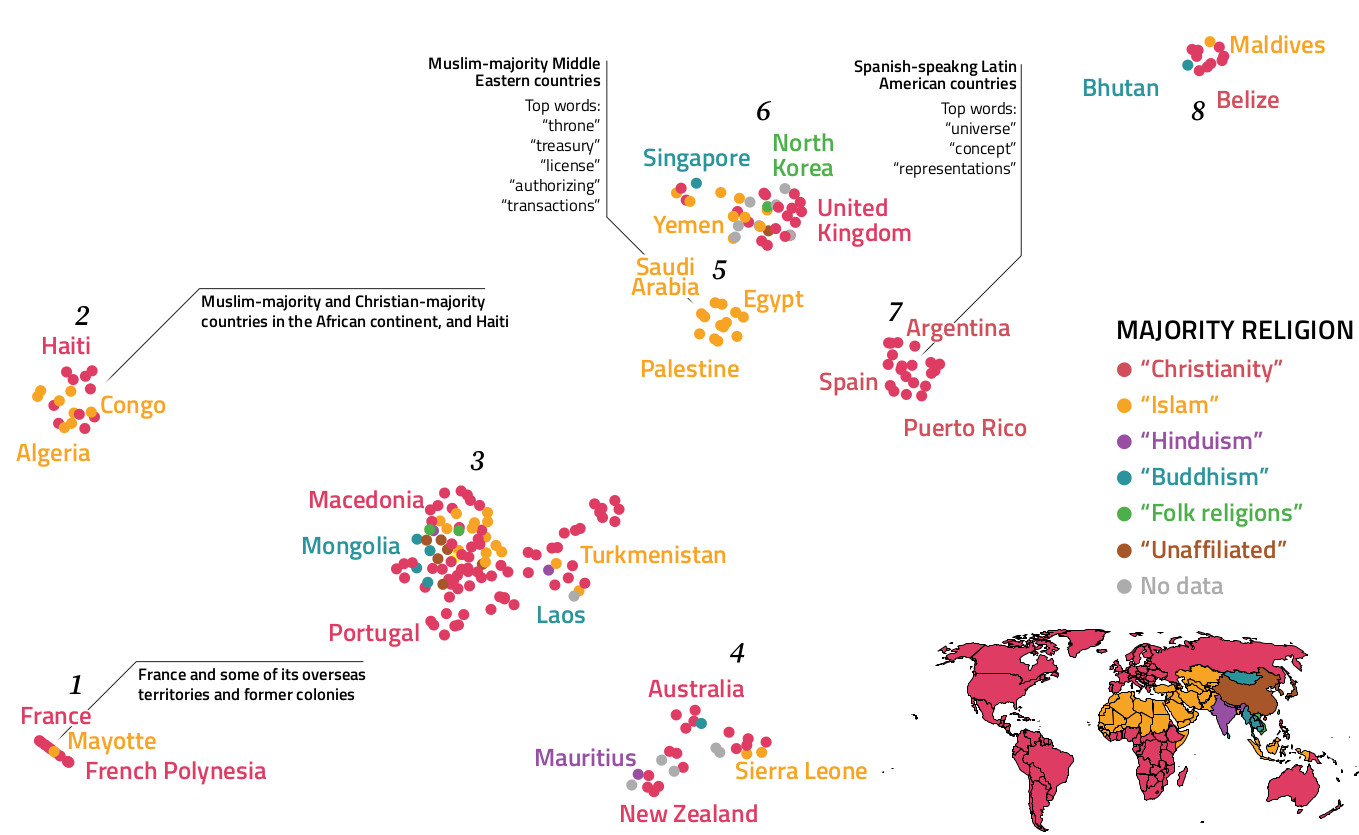
Fig. 8. Visualization of worldwide results for searches for “god” using UMAP. Each country is colored according to the religion with the largest share of followers in it, as indicated by the map and legend on the right. The religion data were compiled in 2010 by the Pew Research Center. Note that the Pew data use questionable categories, such as “folk religions,” and reproduce the nineteenth-century European myth of “world religions.”
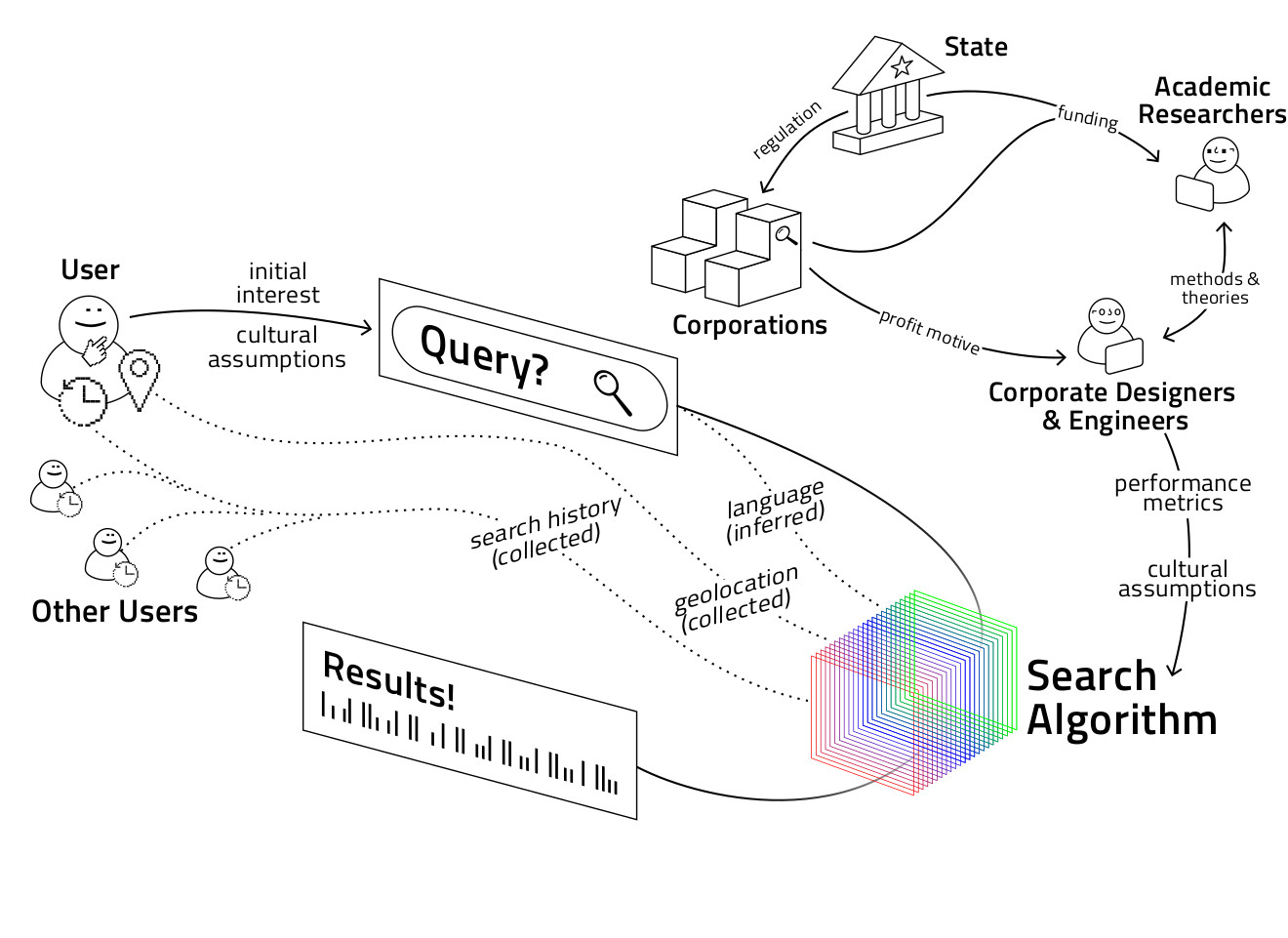
Fig. 2. Search results are products not only of the users’ own interests but also of complex struggles among the state, corporations, and academia. Search algorithms encode the cultural assumptions and performance metrics of the designers and engineers, which in turn are shaped by corporate profit motives, state regulations, and academic methods and theories. For a particular query, the search algorithm may tailor the results according to the user’s search history, geolocation, and language, as well as other users’ data.
Sign up for updates
How to cite
ACM reference format
Rodrigo Ochigame and Katherine Ye. 2021. Search Atlas: Visualizing Divergent Search Results Across Geopolitical Borders. In Designing Interactive Systems Conference 2021 (DIS '21). Association for Computing Machinery, New York, NY, USA, 1970–1983. DOI:https://doi.org/10.1145/3461778.3462032
BibTeX
@inproceedings{SearchAtlas,
author = {Ochigame, Rodrigo and Ye, Katherine},
title = {Search Atlas: Visualizing Divergent Search Results Across Geopolitical Borders},
year = {2021},
isbn = {9781450384766},
publisher = {Association for Computing Machinery},
address = {New York, NY, USA},
url = {https://doi.org/10.1145/3461778.3462032},
doi = {10.1145/3461778.3462032},
booktitle = {Designing Interactive Systems Conference 2021},
pages = {1970–1983},
numpages = {14},
keywords = {critical visualization, geopolitics, critical search},
location = {Virtual Event, USA},
series = {DIS '21}
}Contact the team
During the making of this work, Ye was supported in part by NSF Award #1910264, a Microsoft Research PhD Fellowship, and a fellowship from the Center for Arts, Design + Social Research.
